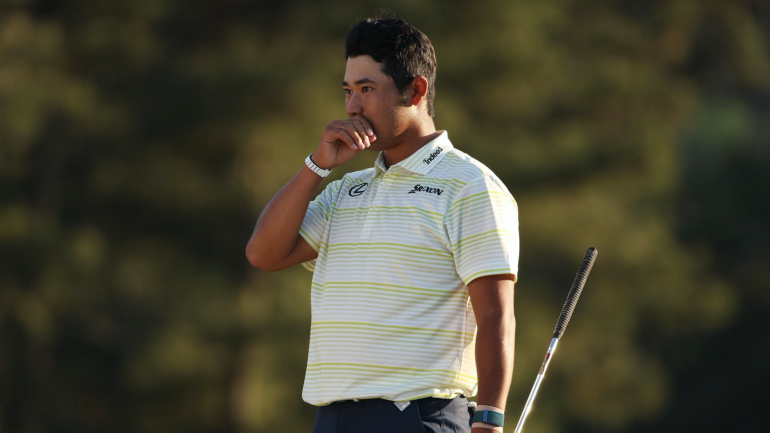
AUGUSTA, Ga. -- Hideki Matsuyama is a man bereft of emotion. At least that's how the 2021 Masters champion makes it seem. He is notorious for this within golf circles. Approach shots to 10 feet get a side-eye glare. Smothered drives get stared down like they're flying off the property. Matsuyama leads the world in strokes gained when one hand flies off the club.
So how would he react to winning the most emotionally overwhelming event in the world? Is Hideki Matsuyama a man bereft of emotion, or is he simply a man who does not disclose the giant emotions that he feels?
Matsuyama stood on the first tee box at Augusta National on Sunday afternoon aiming to win not only his first major championship but the first for any Japanese man in the 150-year history of major golf championships. His weight was two-fold, but he looked like he always looks: stoic and maybe even a bit cold, like a man who is not there to take a stroll around the most magnificent track in the world.
This one, he said, felt different. Still, he gave nothing.
"My plan this morning was to wake up about 9:30," Matsuyama revealed afterward. "But needless to say, I arose much earlier than that and couldn't go back to sleep. So I came to the golf course early. Had a really good warm-up. I felt really good going to the first tee, until I stood on the first tee, and then it hit me that I'm in the last group of the Masters Tournament, and I'm the leader by four strokes.
"And then I was really nervous."
A really nervous Matsuyama went on to shoot the exact score he needed to shoot to win the 85th Masters by a single stroke. A 73 that was both much prettier and much uglier than the number implies.
After a 2-under 34 on the first nine, the tournament felt like it was over. But if this 72-hole slugfest has taught us anything (and sometimes I do wonder if it churns out lessons over the year), truly insane things happen over the final two hours of play. This year would not be exempt.
Matsuyama stood on the 11th green up six strokes on the field. Six! He stood on the 16th tee box up ... two.
What happened in between? A lot. Xander Schauffele -- playing with Matsuyama -- made four birdies in a row, and Matsuyama bogeyed No. 12 and No. 15 after (according to him) flushing a 4-iron so well it flew the 15th green and went into the pond on No 16. Schauffele had the honors on the 16th tee, and the tournament legitimately felt up in the air for the first time in two days.
However, Schauffele made triple bogey, and though Matsuyama made yet another bogey, he still led by two over 24-year-old Will Zalatoris. A par at No. 17 and an absolutely blistered tee shot on No. 18 got the job done.
After a final bogey at the last to escape with the win, Matsuyama's caddie put the last pin in the ground on a spectacular 85th Masters and bowed to the Augusta National course in a sign of respect.
It was perfection.
"Man, he was something else," said Schauffele, who played with Matsuyama all weekend. "He played like a winner needs to play. He was like a robot."
Amazing.pic.twitter.com/avwxww5DSK
— Kyle Porter (@KylePorterCBS) April 12, 2021
Matsuyama then revealed himself at the green jacket ceremony. Dustin Johnson adorned him with his new lifetime coat, and Matsuyama reached for the sky with both fists.
The same sky under which a thin 19-year-old kid with dreams of one day returning to this place once stood.
The Masters is all about anniversaries. This week alone, the 30th anniversary of Ian Woosnam's win in 1991 was celebrated. So was the 35th anniversary of Jack Nicklaus' miracle victory in 1986. More notoriously, there were tales of the 25th anniversary of Greg Norman's famous collapse in 1996, and the 10-year anniversary of Rory McIlroy's meltdown in 2011 when Charl Schwartzel went on to win.
So it is fitting that exactly 10 years after Matsuyama took low-amateur honors at that same 2011 Masters, he bookended that phenomenal performance as a 19-year-old future superstar with an even better one on Sunday: 520 weeks later, he took low-professional honors.
"There are so many great impressions, great memories from this tournament," he said 10 years ago Saturday. "But as I just came up the hill on the 18th hole and I heard the applause from the gallery, that just give me chills ,and I was so happy to hear that. I will finish my college. ... I would like to come back here next year."
Matsuyama did get back to Augusta National the next year. He got back every year after that save one. He'll be invited to every future Masters as well now that he's joined Cary Middlecoff, Jack Nicklaus, Ben Crenshaw, Phil Mickelson, Tiger Woods and Sergio Garcia as the only golfers to win low-amateur honors and follow up that distinction with a green jacket.
Rick Gehman, Greg DuCharme and Jonathan Coachman react to Hideki Matsuyama's Masters victory. Download and Subscribe to The First Cut Golf Podcast on Apple Podcasts or Spotify.
Too often we measure careers in one-year increments instead of longer, more helpful time periods. If you look at any cross-section of Matsuyama's career, it might not seem all that impressive. But if you view at his arc in totality, it's spectacular. He's won six times on the PGA Tour, including big-boy events at the Memorial and a pair of World Golf Championships. He now has eight top 10s at major championships (at least one at all four) and a jacket everyone covets.
But careers are full of ups and downs, and Matsuyama has experienced a lot of both over the course of his. Just like Jordan Spieth last week at the Texas Open, Matsuyama broke a nearly 1,400-day drought of not winning a PGA Tour event. Before that drought, he won four times in 19 months.
Ups and downs. Famine and flush. Abundance and nothing.
Matsuyama has always been known as one of the great ball-strikers of his generation, but a putter that couldn't put it in Rae's Creek if you poured a bucket of balls on the 13th green always seemed to let him down. This week, however, it cooked. Matsuyama finished in the positive in strokes gained putting this week, which for him is tantamount to making everything he looks at.
This is a good thing, too, because players like Matsuyama are worthy at least one major championship. He's on that knife's edge where, if you have a hot week with the putter, you grab one of the four big ones. That is never a guarantee, however, and you might go 20 straight years and find yourself empty-handed.
So while it's unlikely that Matsuyama wins several majors over the course of his career, this weekend at Augusta National -- just like that weekend 10 years ago -- was magic.
It's certainly a different kind of special when you're 19 and life seems to go on forever than it is when you're 29 and feel the weight of adulthood and everything that comes with being the best professional athlete in your sport from a country obsessed with the game but without substantial success in it stateside like Japan.
Matsuyama is a reticent torchbearer. He does not want the spotlight. When asked about what the Olympics in Tokyo could mean for him later this year, he responded, "If I am on the team."
The only thing that really got him fired up was a question about how the man who was 10 years ago a kid could inspire future low amateurs and possibly even Masters champions from Japan.
"It's thrilling to think that there are a lot of youngsters in Japan watching today," he said. "Hopefully in five, 10 years, when they get a little older, hopefully some of them will be competing on the world stage."
If there are those who seek similar success in this sport, they would do well to emulate Matsuyama, whose stoicism belies his generosity and his appreciation for the biggest moment of his career.
Asked what he was thinking when the final putt dropped, Matsuyama said he was happy for his caddie because that was his first victory on the bag for Matsuyama. But then he said something else, and if you were not listening closely, you may have missed it.
As he walked from the 18th green to sign his scorecard, Matsuyama got choked up. As he walked past the patrons and the tower on No. 18 and up the roped walkway where so many legends have walked toward a green jacket, something flashed across his face.
Was it relief? Peace? What did I see?
Matsuyama glanced off to the side, and his mouth quivered just slightly. He looked like a man who had become just the 54th human being to win the Masters while simultaneously trying not to let that realization take his breath away.
And damn, it was brief, and it was understated, but it was something I will never forget.
"It started sinking in," he said of the moment just before taking that wonderful walk. "The joy of being a Masters champion."

















